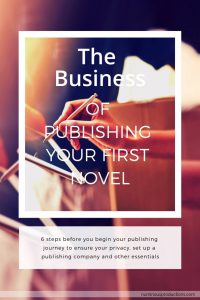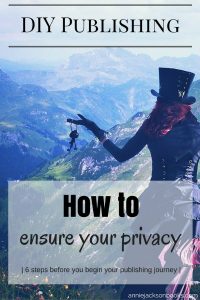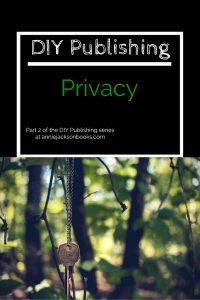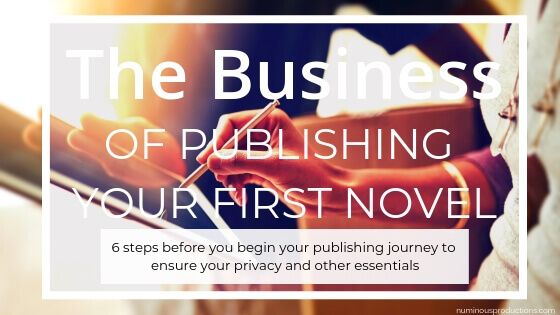So you’ve written a spectacular book and are ready to share it with the world. Rock on! DIY Publishing is all about taking the reins of your career and not waiting for permission to share your art.
Hold on for just a moment though. As tempting as it is to hit that shiny Publish button, there’s two important things you need to consider first: Privacy and Branding.
Everyone hopes to one day be a best selling author (at least, I think every author hopes for that…). But we all know fame comes with a price. And best selling author or not, when you publish a novel you become, to some degree, a public figure. Your name, your likeness, your work all exist to some extent beyond your control. So, it’s important to create a separation between public you and private you.
Which is not to suggest you should be inauthentic in your blogging or social media or interactions with readers and fans. That authenticity is an important part of Branding.
Privacy, however, is all about business.
Set up a business
This section is pretty US specific. While the methodology to protect your privacy should be similar, if you’re outside the US you’ll need to find the appropriate parallels.
Setting up a publishing business may sound daunting, but it’s actually fairly simple given the scale you’re probably going to be working with (at least at first). You only need 4 things:
- Business Trademark
- EIN
- Email Address
- Bank Account
Trademarks and Business Names
Most people will probably tell you to set up an LLC and a few years ago, I would have been one of them. But the reality is, unless you’re making $50,000/year then an LLC is a bit of overkill.
Side note: If you are making $50,000 or more per year from your books then, don’t read this – hire a professional business manager/lawyer/financial analyst to structure your business.
If you’re still getting started, then a trademark will suffice for establishing your business.
You don’t need to go the full Federal route to register your trademark. A trademark registered with your state will provide you with a business name, it’s generally not that expensive and can most often be completed online. Just search for “trademark” and your state and the top results should take you right where you need to go (but don’t pay someone else to register it for you – the forms, whatever they are, are so easy you can totally do this!)
The red tape around a trademark is much simpler than an LLC (you don’t need Articles of Organization or any of the other extraneous documents) and less expensive (you don’t have to pay an annual fee – trademarks generally need to be renewed every 5 years or so).
The bottom line, though, is whether you choose a trademark or an LLC, you’re better off with a separate entity for the business of publishing your work. It serves as your public front for contracts, taxes, financial interactions, etc.
Having a trademark also lends your books credibility. By creating your own publishing company for your work and having that company name on your title page, on Goodreads, on ISBN information and everywhere else is the professional stamp you need.
Get an EIN
After you’ve registered your trademark, get an EIN for tax purposes (in the US – I’m not sure what the equivalent is in other countries).
The important thing here is that when you sell copies of you book, you have to pay taxes on those sales. If you don’t have an EIN, you’re going to have to give your social security number out all over the place. And particularly to companies that are already hoarding as much personal information about you as they can.
An EIN allows you to report those sales for your taxes and protect your social security number. You can get one for free (and if you went the trademark route – you can get an EIN as a sole proprietor, you don’t need an LLC).
Set up your business email
A business email gives your company a level of professionalism (flashfan342@email.com is fine for your mom – not so much for your company).
It creates a way for people to contact you apart from your personal email. Which also focuses all your business correspondence separately from your personal email (because there’s A LOT of places you have to provide your email address).
It’s best to have an email address that corresponds with your company name and it’s easy enough to create a Gmail or Outlook account using some version of your business name. (See Setting Up Accounts for your Author Website to decide if Gmail or Outlook is better for you.)
Open a bank account for your business
When you register a trademark (or an LLC) you’ll generally want a separate bank account for those finances. If anyone is ever going to write you a check, you’ll need an actual business account. If you’re primarily going to get direct deposits (from online sales) than you can skirt this a bit and have the money deposited in a non-business checking or savings account.
Either way, a separate bank account reinforces that separation between your private finances and your business. It also provides an easy way to see how much you’re actually making from book sales.
You might also consider a credit card dedicated to author/publishing expenses to separate your business expenses from your personal expenses (to easily track tax deductions). Though it’s not that big of a deal if you sell a hundred copies of your books a year.
Resources
CapitalOne360 offers free personal checking and savings accounts (no fees, no minimums, no direct deposit requirements). You earn interest on the checking account (something like 1% annually so it’s not much but it’s also not nothing) and you can have multiple savings accounts if you want one for each book vendor (depending on how much you make and how particular you really want to be).
SoFi Money also offers free personal checking/savings accounts (no minimums, no direct deposit requirements and no fees). You get paid a higher interest rate than CaptialOne360 but it’s not quite as versatile with offering multiple accounts.
If you want an actual business account (different rules on setting up and you can deposit checks made out to your business) then Azlo is an online banking option designed for entrepreneurs just getting started. Most other banks charge fees or have minimum balances when it comes to business accounts. If you’re just getting started you want something that isn’t going to cost you more money than you’re making. Plus Azlo is super convenient and their mobile app makes it easy to deposit checks. (You’ll need that EIN you registered for.)
Bonus step: Get a PO Box
When you upload your manuscript you’re going to need to provide your address several times.
And if bloggers request a review copy and you mail it with a return address. Or when readers want to send you something fun or when you need to provide an address for different business transactions.
You don’t want everyone to know where you live.
Especially if you become a best selling author.
Maybe it takes 2 years and maybe it takes 25 but if you’ve been cavalier about your address and then one of your books takes off and suddenly you have thousands of readers who all want to know more about you and you’ve been throwing your home address everywhere… you want to enjoy your writing, enjoy your popularity and still feel safe.
You can get a PO Box for about $100/year at usps.com or at a local mailbox company.
Signatures and Security
Come up with your “author” autograph and make sure it’s different than your signature on legal documents, checks and credit card authorizations.
I know most of our signatures are pretty much gibberish when we sign for credit card purchases these days, but it’s still a good idea not to make it easy for someone to forge your ‘legal’ signature by copying a book you signed.
Also, keep the answers to security questions for your accounts private. In fact, come up with easily remembered lies. It’s too easy to search for your mother’s maiden name, or your high school mascot. If the answer isn’t actually the truth it creates an additional layer of security.
Names
Though the reasons you might use a nom de plume have changed in the era of digital publishing, now is a good time to consider it and decide if it’s better for you to publish with your name or a pen name. If nothing else, it’s one more way to create a separation between your public life and your private life.
Also, think about protecting your family when you consider what you’re posting online. Many authors avoid using the names of their spouses and children, don’t post pictures of their children online, avoid references to their hometown in twitter or instagram posts, etc. It’s mostly basic internet safety, taken up a level or two with the expectation that one day, people will want to know as much as possible about you. You, in turn, want to connect with your readers and fans and still feel safe.




